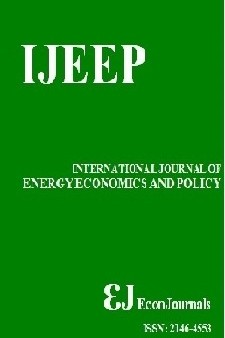Analysis of Income Elasticities of Brazil’s Energy Matrix
Analysis of Income Elasticities of Brazil’s Energy Matrix
- Başlangıç: 2011
- Yayıncı: İlhan ÖZTÜRK
Economic and Technical Feasibility of Metering and Sub-metering Systems for Heat Accounting
Luca CELENZA, Marco DELL’ISOLA, Giorgio FİCCO, Marco GRECO, Michele GRİMALDİ
China in Innovative Development of Alternative Energy Advanced Industrial Technologies
Mihail Nikolaevich DUDİN, еvgenia еvgenevna FROLOVA, Petr Aleksandrovich KUCHERENKO, Vitaly Aleksandrovic VERNİKOV, Natalia Andreevna VOYKOVA
Assessment of the Required Changes of Russian Ecological Taxes
Tatiana Olegovna TAGAEVA, Alexander Olegovich BARANOV, Vadim Manavirovich GİLMUNDİNOV
Uncertainty of Oil Proved Reserves and Economic Growth in Iran
Elaheh Asadi Mehmandosti, Fatemeh Bazzazan, Mir Hossein Mousavi
Sustainable Economic Growth: An Empirical Study for the Asia-Pacific Economic Cooperation Forum
The Convergence Behavior of CO2 Emissions in Seven Regions under Multiple Structural Breaks
Energy Price Uncertainty and Investment: Firm Level Evidence from Indian Manufacturing Sector
Rajesh H. Acharya, Anver C. Sadath
Barriers to Energy Saving for Public Middle Schools in Bangkok: From School Management Perspective
Wuttipan KİATRUANGKRAİ, Ekachai LEELARASMEE
The Effects of Electricity Consumption on Agriculture, Service and Manufacturing Sectors in Malaysia
